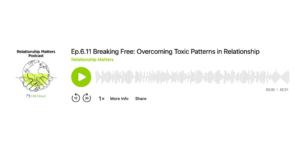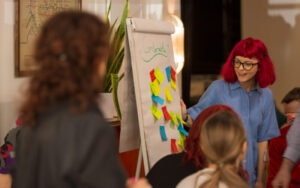The Power of Team Coaching in Conflict Resolution
Conflict is a natural and inevitable part of any team dynamic – let’s normalise it! While it can be uncomfortable, conflict also presents an opportunity for growth, stronger collaboration, and deeper understanding. Team coaching provides a structured and effective way to resolve conflicts and transform team relationships, helping individuals work together more productively. With the right tools and techniques, team coaching can turn tension into a catalyst for greater collaboration and improved communication.
Let’s explore how team coaching helps with normalising, mediating and resolving conflicts, the techniques coaches use to identify and address team friction, and the long-term benefits of resolving conflict through coaching.
The Role of Team Coaching in Resolving Team Conflicts
Team coaching is designed to focus on the relationships and dynamics between team members, rather than just individual performance. By taking a systems approach, team coaches help teams understand the underlying causes of conflict and work through them together. Coaches act as neutral facilitators, creating a safe space for honest conversations while helping teams navigate difficult issues.
In conflict resolution, team coaching offers several key advantages:
- Neutral Mediation: Coaches serve as impartial mediators, ensuring that every team member has a voice and that all perspectives are considered. This reduces bias and prevents conversations from becoming personal or accusatory.
- Promoting Understanding: Coaches help teams explore the root causes of conflict, which are often based on misunderstandings, misaligned expectations, or differing communication styles. Through open dialogue, coaches guide teams toward greater understanding of each other’s viewpoints.
- Creating a Collaborative Approach: Rather than focusing on assigning blame or identifying winners and losers, team coaching emphasises finding solutions that benefit the whole team. The aim is to strengthen the team as a unit, rather than resolving conflicts at the individual level.
Techniques Used by Team Coaches to Resolve Conflict
Team coaches have a wide array of tools and techniques at their disposal to help resolve conflicts and improve team dynamics. Here are some of the most effective methods commonly used:
1. The 3rd Entity
The 3rd Entity is a core tool from the Organisation and Relationship Systems Coaching (ORSC) methodology. It helps teams shift the focus from individual perspectives to the team’s collective identity. This tool encourages teams to consider their relationships and dynamics as a shared entity, rather than being stuck in “me vs. you” conflicts.
- How it works: Coaches guide the team in visualising their collective voice and considering what is best for the “relationship system” (the team as a whole). This perspective helps team members move beyond personal frustrations and focus on what’s best for the group.
2. MetaSkills for Emotional Awareness
Emotions often play a significant role in conflicts, whether through frustration, fear, or miscommunication. MetaSkills is an ORSC tool that helps team members recognise and understand their own emotions and those of others. By developing emotional intelligence, teams can manage emotional triggers and reduce reactive behaviour that often escalates conflicts.
- How it works: Team coaches lead exercises that help members become more aware of their emotional responses and the impact those emotions have on others. This heightened awareness leads to more thoughtful interactions and better emotional regulation.
3. Deep Democracy
Deep Democracy is a technique that encourages open dialogue and ensures all voices within the team are heard, including minority or dissenting opinions. It is particularly useful in surfacing hidden tensions or unspoken concerns, which, if left unresolved, can undermine team cohesion.
- How it works: Team coaches create space for all opinions, including those that may not align with the majority. By giving equal weight to every perspective, Deep Democracy helps teams address underlying tensions that might otherwise be overlooked, leading to more inclusive decision-making.
4. Designed Team Alliances (DTA)
The Designed Team Alliance (DTA) is a proactive ORSC tool that allows teams to co-create agreements about how they will communicate, make decisions, and resolve conflicts. This tool establishes a clear framework for how the team operates, minimising the likelihood of future conflicts by aligning expectations from the start.
- How it works: In a DTA session, coaches facilitate discussions where the team outlines the rules of engagement, including how they will handle disagreements. This collaborative agreement provides a reference point for navigating future tensions and creates a sense of ownership over the team’s dynamics.
Long-Term Benefits of Resolving Conflicts through Coaching
When conflicts are resolved through coaching, the benefits extend far beyond immediate tension relief. Teams that successfully navigate conflicts with the help of coaching experience long-term improvements in their dynamics, communication, and collaboration. Here are some of the key benefits:
1. Higher Collaboration
By resolving conflicts, teams learn how to work together more effectively. Coaching encourages open dialogue, which fosters trust and respect among team members. This makes collaboration easier and more natural, as team members are more likely to share ideas, support one another, and work toward common goals.
2. Improved Communication
Conflict resolution through team coaching enhances communication skills within the team. Teams learn how to express their concerns constructively, listen actively, and seek to understand each other’s perspectives. These improved communication practices help prevent future conflicts and ensure that when disagreements do arise, they are handled more effectively.
3. Increased Emotional Intelligence
Team coaching promotes emotional intelligence by encouraging team members to recognise and manage their emotions and to empathise with others. Teams with high emotional intelligence are more resilient in the face of challenges and are better equipped to navigate difficult situations without allowing emotions to escalate conflicts.
4. Stronger Team Relationships
Successfully resolving conflicts strengthens relationships within the team. Team members develop a deeper understanding and appreciation of each other’s strengths, perspectives, and working styles. As a result, the team becomes more cohesive and able to handle challenges with greater unity.
Success Stories from CRR UK
At CRR UK, we have seen firsthand how team coaching has transformed teams by resolving conflicts and enhancing collaboration. One success story involved a leadership team at a large organisation facing significant internal conflict. Team members had clashing communication styles and struggled to align on key strategic decisions, which was delaying progress and creating tension.
One of our ORSC coaches introduced tools like the 3rd Entity and Deep Democracy to help the team understand each other’s perspectives and focus on their collective goals. Through guided coaching sessions, the team began to communicate more openly and address their disagreements constructively. By shifting the focus from individual frustrations to the team’s overall success, they were able to resolve long-standing conflicts and improve their decision-making process.
The result? A stronger, more collaborative leadership team that communicated more effectively, leading to faster decision-making and greater organisational success.
Team coaching is an invaluable tool for resolving conflicts and fostering collaboration within teams. Through techniques like the 3rd Entity, Deep Democracy, and MetaSkills, team coaches help teams navigate conflict in a way that builds stronger relationships, improves communication, and promotes long-term success.
By addressing the underlying causes of conflict and fostering open, honest dialogue, team coaching not only resolves immediate tensions but also equips teams with the skills they need to handle future challenges with confidence. Whether you’re facing communication breakdowns, personality clashes, or misaligned priorities, investing in team coaching can transform conflict into an opportunity for growth, collaboration, and stronger team performance.






